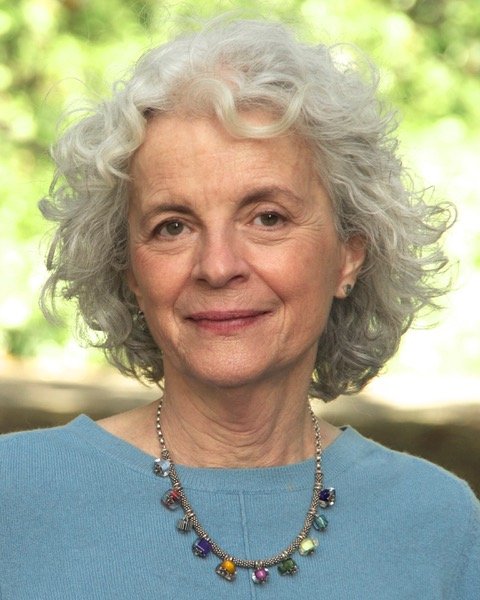
Susan Sands, PhD
Photo by Nan Phelps
Susan Sands, PhD is an internationally recognized clinical psychologist best known for her trail-blazing work on eating disorders, body image, dissociation, female development, and aging. She publishes, presents, and teaches on these subjects and is a core faculty member at the Psychoanalytic Institute of Northern California in San Francisco and an associate clinical professor at UC Berkeley. She lives in Berkeley, where she maintains a private practice in psychotherapy and supervision of other therapists.
Susan grew up in Evanston, a suburb of Chicago, where a photo was taken of her at age 10 reading A Primer of Freudian Psychology. As a child, she also loved to write, sing, swim and walk in nature––interests which remain ascendant to this day. She has been an avid member of Voci Women’s Vocal Ensemble, a high-level women’s Bay Area singing group, for almost 30 years. You can often find her hiking these days in the beautiful East Bay hills. She lives in Berkeley with her husband, Fred, and she has a son, Dan, and daughter-in-law, Jessica, in Arcata, California.
She received a PhD in psychology from the University of California, Berkeley (1981), a BA in English cum laude from Cornell University (1968), and an MAT from Yale (1969).
Before becoming a psychologist, she spent almost a decade in the field of journalism, working as a reporter at Newsweek, an editor and writer at The Saturday Review, Rags Magazine and The Contra Costa Times, and an on-the-air reporter for “Newsroom” on KQED, the San Francisco PBS affiliate.
The empowerment of women has always been near and dear to her heart. In the past, she did volunteer publicity for the National Organization for Women and The National Women’s Political Caucus and has written news articles and made videotapes on the women’s movement. Susan was vice president of the Spring Foundation, which gave grants to doctoral students studying resilience in women. While she was at Newsweek, she was one of 46 women who filed a complaint with the Equal Economic Opportunity Commission (EEOC) charging discrimination in hiring and promotion, which ultimately led to women being included in all levels of management.
Susan’s long-term interest in Buddhist thought and the practice of meditation has also been an important influence. She has attended dozens of meditation retreats, and she incorporates Buddhist thought and meditative practices into her work with patients.
Since getting her doctorate in 1982, Susan has been giving papers, presentations, and trainings on body-based issues at institutes, training programs, graduate schools, hospitals and conferences across the country and the world, including those sponsored by the International Association of Relational Psychoanalysts and Psychotherapists (IARPP), the International Association of Psychoanalytic Self Psychology (IAPSP), the Psychoanalysis Division of the American Psychological Association, and the William Alanson White Institute in New York.
The majority of her 20-plus, highly-respected professional articles explore the themes of this book: body development, mind/body integration and healthy aging. In a 2015 book entitled Body States, she is referred to in the Introduction as one of eight “trailblazers” in “our understanding of eating disorders and bodies.”¹ Her articles on eating disorders are widely used not only by other psychologists and teachers but also by those running eating disorder treatment centers and, sometimes, by patients themselves.
1. Jean Petrucelli, Ed. (2015). Body States (New York: Routledge), p. 1.
Selected professional publications
Sands, S. (1989). “Eating Disorders and Female Development (Ed. Arnold Goldberg, Dimensions of Self Experience: Progress in Self Psychology, 5. (Hillsdale, N.J: Analytic Press): 75-103. https//:psycnet.apa.org.
Susan, S, (1991). “Bulimia, dissociation and empathy” Ed. Craig Johnson, Psychodynamic Treatment of Anorexia Nervosa and Bulimia. (New York: Guilford, 1991) 34-50. https//:psycnet.apa.org.
Sands, S. (2003). “The subjugation of the body in eating disorders,” Psychoanalytic Psychology. 20. 103-116. https//:psycnet.apa.org.
Sands, S. (2009). “Less time ahead, more behind: Being a psychotherapist in the last third of life,” Women and Therapy, 32:158-69. https://doi.org/10.11080/02703130902851948.
Susan, S. (2016). “Eating disorders treatment as a process of mind-body integration,” Clinical Social Work Journal, 44:1 (2016) 27-37. https://doi.org/10.1007s10615-015-0540-7.
Susan, S. (2020). “Body experience in the analysis of the older woman,” Psychoanalytic Inquiry, 400:3 (2020) 173-188. https://doi.org/10.1080/07351690.2020.1727208.
